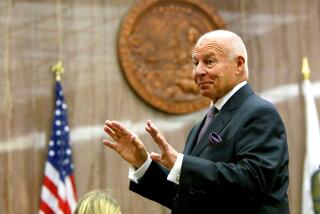Bookkeeper Cites Confusion in Wrong Listing of Hedgecock Bill
- Share via
A controversial $2,000 bill for video seminars was listed as a “Hedgecock campaign account” in Tom Shepard & Associates’ records in 1982--before the firm had a contract to run Roger Hedgecock’s 1983 mayoral race--because a bookkeeper “wasn’t sure how to categorize” the expense, not because Shepard instructed her to do so, testimony in the mayor’s felony retrial revealed Thursday.
The testimony by former Shepard bookkeeper Julia (Mo) Whitworth appears to undercut the prosecution’s contention last week that the handling of the $2,000 bill demonstrates that Hedgecock knew that Shepard’s political consulting firm, in violation of local election laws, provided him with free campaign services.
“If this was something Mo Whitworth decided to do on her own, how can there be a conspiracy?” a jubilant Hedgecock asked after his defense attorney, Oscar Goodman, elicited the testimony from Whitworth during her second day on the witness stand.
Prosecutors, however, note that regardless of how the expenditure was listed in Shepard’s financial records, the firm did pay the $2,000 bill and never was reimbursed by Hedgecock’s campaign committee. That fact alone, prosecutors say, is sufficient to show that Hedgecock received unreported services from Shepard’s firm--an argument that Goodman rebutted by emphasizing that the bill was sent to Shepard, not Hedgecock.
“The importance of this ($2,000 bill) is that the prosecution was arguing that it was proof of a conspiracy,” Goodman said. “Mo Whitworth’s testimony destroys that argument.”
Hedgecock faces 15 felony conspiracy and perjury counts alleging that he conspired with former J. David & Co. principals Nancy Hoover and J. David (Jerry) Dominelli to funnel tens of thousands of dollars in illegal donations to Hedgecock’s 1983 race through Shepard’s consulting firm. The mayor also faces a single misdemeanor conflict-of-interest charge.
As the mayor’s retrial recessed until Tuesday, both sides expressed pleasure with different parts of the testimony from Thursday’s five witnesses, highlighted by:
- San Diego real estate developer Patrick Kruer’s testimony that Dominelli, at a February, 1983, dinner party in Utah, expressed an intense dislike of Hedgecock’s 1983 opponent, former San Diego City Councilwoman Maureen F. O’Connor, and said that he intended to “work very hard” to help elect Hedgecock in the special May, 1983, mayoral race.
- Evidence supporting the mayor’s explanation that he sold Shepard a computerized mailing list for $3,000 in a deal whereby the consultant could use the list to attempt to solicit other clients in return for updating the data about registered voters and key Hedgecock supporters. That contract is a focal point of the case, because Hedgecock argues that services performed by Shepard’s firm in early 1982 that the prosecution describes as illegal campaign work actually involved updating the list.
- San Diego County Sheriff John Duffy’s disclosure that Hedgecock told him in May, 1981, that his political ambition was to be mayor of San Diego. “So what?” Hedgecock said later. Goodman also dismissed Duffy’s testimony as “worthless,” noting that the trial hinges not on when Hedgecock began contemplating a possible mayoral race, but whether he broke the law to realize his aspiration. In addition, Goodman argued that Duffy’s admission that he has endorsed some of Hedgecock’s past opponents further discredited the sheriff’s testimony.
The $2,000 bill that Whitworth discussed during her testimony Thursday came to light last week, when a former local news anchorman testified that he coached Hedgecock in late 1981 and early 1982 about how to improve his deportment on television. Tom Lawrence, an anchorman at KFMB-TV (Channel 8) from 1973 to 1978 who now fills the same position at KHJ-TV in Los Angeles, added that the bill for the lessons, in which he videotaped Hedgecock in mock news conference settings and then critiqued his performance, was paid by Tom Shepard & Associates.
In earlier testimony, Gregory Dennis, one of Tom Shepard & Associates’ original partners, testified that the $2,000 check was listed in the firm’s March, 1982, ledger in the “Hedgecock campaign account”--even though the firm did not sign a contract with Hedgecock’s campaign committee until five months later.
Assistant Dist. Atty. Charles Wickersham had emphasized the handling of the $2,000 expense, citing it as evidence that the alleged conspiracy to use Tom Shepard & Associates as a political laundry for illegal contributions to Hedgecock’s potential mayoral race was already in operation.
On Thursday, however, Whitworth provided a completely different explanation for how the $2,000 bill came to be listed in the Shepard firm’s financial records under the heading “Hedgecock campaign account.”
Noting that Shepard kept very poor records, Whitworth explained that it sometimes “wasn’t clear exactly” how certain transactions--including the $2,000 video seminars bill--should be recorded in the firm’s books.
Asked by Goodman why she had listed the bill as a “Hedgecock campaign account,” Whitworth replied, “It was my assumption at the time that the services were done for Roger, and I wasn’t sure how to categorize it.”
“Were you told by anyone to characterize this as a campaign account?” Goodman asked.
“No,” replied Whitworth, who maintained the Shepard firm’s books between about February, 1982, and February, 1984.
“So this was something that you did on your own?” Goodman inquired.
“Yes,” Whitworth answered.
Kruer’s testimony Thursday was a repeat of that which he delivered in Hedgecock’s first trial, which ended in February in a mistrial with the jury deadlocked 11-1 in favor of conviction.
At a Feb. 12, 1983, dinner party in Deer Valley, Utah, attended by, among others, Kruer, Dominelli and Hoover, Dominelli expressed a “very intense . . . dislike” for mayoral candidate O’Connor, Kruer testified.
“He (Dominelli) said he was going to help support Roger Hedgecock and work very hard for him . . . in the mayoral election,” said Kruer, who contributed to O’Connor’s 1983 race.
Prosecutors hope that jurors will regard Dominelli’s remarks as circumstantial evidence of the alleged conspiracy. However, during his cross-examination of Kruer, Goodman emphasized that Dominelli simply expressed his feelings about the race “with conviction” and that no illegalities were discussed.
Both Whitworth and another witness, computer consultant Warren Ciofal, testified about the controversial mailing list at issue in the case. Prosecutors argue that Shepard’s updating of the list throughout early 1982 was little more than free campaign work for Hedgecock. The defense, though, contends that Shepard’s work on the list also benefited his young firm, founded in January, 1982, because the computerized data was a valuable asset in his search for new clients.
Whitworth testified that she typed the contract between Hedgecock and Shepard concerning the sale of the list in about August, 1982. However, the contract was backdated to January, 1982, the date when Shepard told her that he and Hedgecock had agreed orally on the sale.
Prosecutors view the backdating of the contract as an attempt to provide a legitimate explanation for what they characterize as the Shepard firm’s illegal work on the list. Ciofal, however, testified that, throughout 1982, he continually pressed Shepard for written authorization showing that the political consultant had Hedgecock’s permission to use the list for other clients.
“I remember asking Tom Shepard probably 10,000 times for written authorization backdated to when the file was sold,” Ciofal said. “I almost threatened him with bodily harm. I repeatedly asked him . . . and finally got it.”
More to Read
Sign up for Essential California
The most important California stories and recommendations in your inbox every morning.
You may occasionally receive promotional content from the Los Angeles Times.













